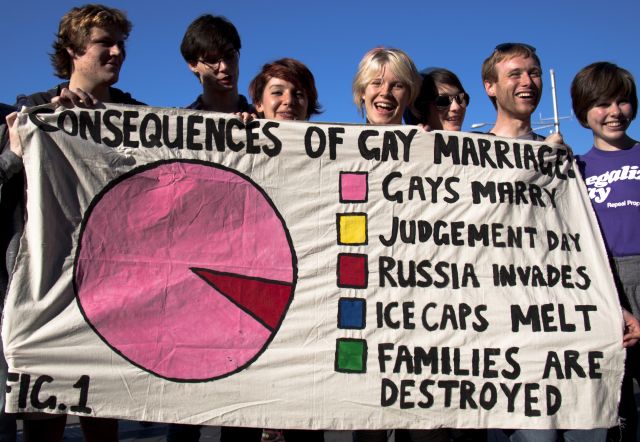
Veteran queer rights activist Steve Warren gave the speech below at the “1Love: equality, marriage, freedom” conference in Sydney on December 4.
I am speaking from the perspective of the 1970’s, which influenced our views. 78ers fought for equality for all in the gay, lesbian, bisexual, transgender, transsexual, queer, intersex (GLBTQI) community, and we supported our Indigenous, multicultural, disabled and heterosexual friends who stood beside us in our struggles in unity as one voice for equality. Equality was foremost in our minds.
1978 was a milestone in our GLBTQI history, but not forgetting many actions that went before — from our first gay and lesbian convicts to gay and lesbian bars in the 1930s, to the Campaign Against Moral Persecution (CAMP) from 1971 onwards, the Gay and Lesbian Rights lobby, the 1978 Mardi Gras and beyond.
Mardi Gras continues to be a protest voice for the inequities that still exist and a celebration of who we are as a community.
I speak today as an individual from that community of 78ers that started the ball rolling on what we now know as “Sydney Gay and Lesbian Mardi Gras”.
The 78ers come from various backgrounds and beliefs, like all communities. Marriage is not necessarily favoured by all in our community as it has been associated for centuries as a heterosexual union — including throughout Greek and Roman times and up to the involvement of modern religions, consolidating in the Christian church recognition and sanction of marriage in the 12th century.
The ’70s was also an age of freedom of expression and marriage was often seen as an unnecessary ritual, many aspects of what was seen as “bureaucracy” were rejected. It was the “age of Aquarius”, the age of letting your hair down.
Many of our idols have lasted in long-term commitments without marriage, for example actor Goldie Hawn and her partner Kurt Russell have been together for more than 25 years without marriage.
But many others marriages went through painful divorce or even multiple divorces, like Liz Taylor or more recently Madonna. Both of these relationship commitments, marriage and de-facto relationships, are reflected in our wider community.
There has been a fear that gay marriage is replicating a heterosexual practice, and that the breakdowns that sadly often occurred with marriages left us to question the value of marriage.
But we can’t deny that many of us dreamt of the big wedding as a child or teenager with our same-sex or intersex partner. Indeed, I often imagined a wedding with all the relatives there to turn around to their surprise and see my groom join me down the aisle and my favourite drag queen Trixie belting out some numbers at the reception, and the blessings of the Sisters of Perpetual Indulgence, but our laws denied us this choice to marry.

It is good that the ALP conference passed a motion to allow a conscience vote [on equal marriage]. However, as Labor Senator John Faulkner argued, “A conscience vote on human rights is not conscionable”.
This should have been a policy platform. To get this law through the House of Representatives and the Senate without a Labor policy position informing the vote is risky and highly vulnerable, and many of us would say lacks courage and commitment to an element of human rights.
Most believe that marriage is a commitment to emotional and psychological support between two individuals, a commitment that should be equal in gay or heterosexual relationships.
The tide is turning and many in the heterosexual community believe that gay marriage is way overdue. Indeed, recent polls tell us this view is in a majority.
Since 1978 many things have changed for the positive for the GLBTIQ community. Many barriers in law and discrimination have been broken to the credit of our state and federal governments and due to the strong persistent lobbying from our community and our supporters.
However, we still have unequal ages of consent. We still have education departments balking at education of equality in sexuality. We still have homophobia in the workplace.
How many of us still don’t feel comfortable in the workplace or at events, casually chatting about your same-sex partner when heterosexuals can be quite casual about their relationships?
Kids and teenagers are still bullied in school if they dare to express that they are different. How many schools this year allowed same-sex partners to attend year 10 and 12 formals? Why should they even have to seek special permission? Why are there so many negative pressures [on same sex attracted people] in our rural communities?
Sadly, homophobia and suicide is still quite prevalent in our community and it shouldn’t be. This is not on. This is the result of inequality.
If there were true equality in society then discrimination and negative pressure would not exist for anyone.
Gay marriage is just one necessary step to allow same-sex and intersex people to have the choice to marry their choice of partners.
Gay marriage is an important element in our continued fight for equality. Now is the time for change towards dignity and fairness. Be part of making history just as we did in 1978. Stand up for marriage equality.
[The 78ers will have a float in the 2012 Mardi Gras. Any donations towards the costs for the float is greatly appreciated. Email: [email protected].]